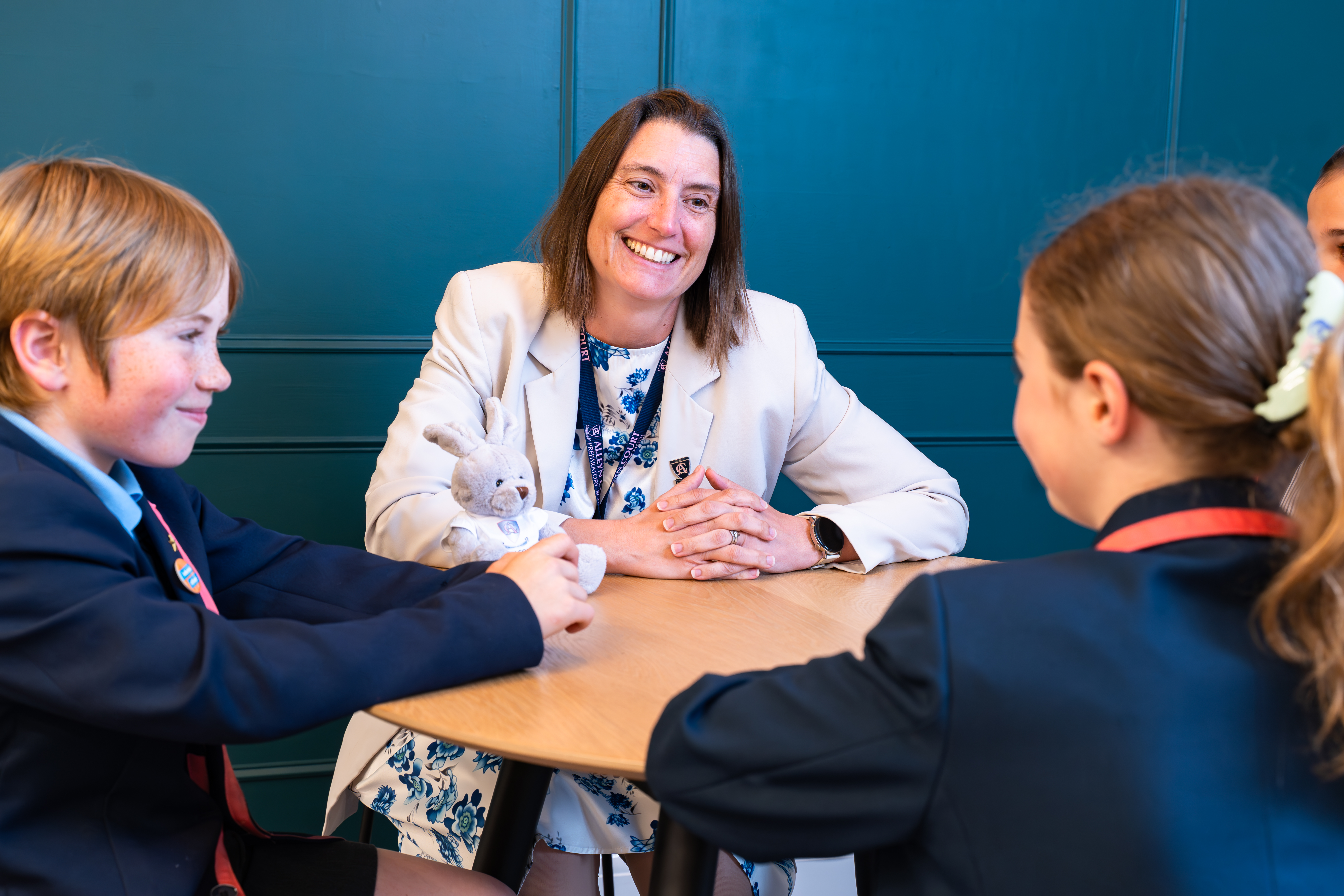
Knowing the most common school interview questions can help students feel prepared and confident when applying to a prestigious secondary school.
Whether it's an independent school or a boarding school, the secondary school admissions process often includes an interview to help schools learn more about prospective students beyond test scores and grades.
Candidates may be asked about their interests, experiences and why they want to attend the school. Understanding these typical questions is important and can help interviewees make a good impression and increase their chances of being accepted.
Ultimately, these schools want to get to know prospective pupils' personalities and see if they would be a good fit for the school community. Being prepared is the best way to approach the admissions process with confidence, so this frequently asked question bank will help you interview successfully.
Understanding the school interview process
Gaining entry to independent and grammar schools often requires passing both an interview and an entrance exam like the 11 Plus. It helps to know what interview styles schools use, how the whole admissions process works and how to handle online interviews for the best chance of success.
Types of school interviews
Schools use several interview formats to assess candidates. The most common are one-to-one interviews with a teacher or admissions officer, where you answer questions about your interests, experiences and goals. There are also panel interviews with two or more staff members, which might feel more formal.
Group interviews are sometimes used to see how you work with others. You may be asked to take part in a discussion or solve a problem as a group. For younger applicants or for specific levels such as the 11 Plus, activities might be more practical or game-based.
Understanding the interview format in advance can help you prepare well. Some schools let you know the format ahead of time, but if not, you can ask the admissions office for details.
Overview of the admissions process
The admissions process for independent and grammar schools starts when you submit an application, sometimes including school reports and reference letters. For many schools, you must also sit the 11 Plus exam or Common Entrance exam.
After the exam, selected applicants are invited for an interview. The interview is a key part because it helps the school judge traits not easily seen in test scores, such as confidence, communication and enthusiasm for learning. Schools may also ask about your interests outside the classroom.
Admissions offices may want to see if you will thrive in their academic and social environment. They look for a good fit between you and the school's ethos, values and teaching style.
School interview questions - academic
Prestigious educational institutions have high academic standards to uphold, so they need to be sure that you'll help them do that. In return, you'll get a first-class education that will give you the edge over the competition when it comes to applying for college, university and jobs later in life.
1. Why do you want to attend this school?
This question helps school leadership understand your passion for their particular school. Perhaps its curriculum aligns with your strengths and interests, or maybe its long-term values speak to you. Make sure you've done your research beforehand, and be honest -- this question will help align yourself with the school.
2.What are your favourite subjects and why?
Many prestigious secondary schools will have a unique curriculum that has key areas of specialisms. This question is designed to understand how your strengths and passions align with it, so it's helpful if your chosen school offers the subjects you enjoy the most. The school wants to meet your educational needs.
3. How do you handle difficult topics in class?
This question will demonstrate how you handle tough situations, and how you'll address academic struggles. Even the most gifted students will occasionally struggle with a topic -- it's about how you approach it and work to understand it that'll set you apart.
4. How do you prepare for exams?
Often, independent schools are assessed on students' exam performance -- and a high percentage of top grades sets them apart. Your preferred school will need to know that you take your exams seriously, with a mix of revision and tactics that help you manage stress and relax.
Behavioural and problem-solving questions
Behavioural questions are common because schools want to know how you act in real-life situations. These schools want to recruit students who are mature and respectful, who can handle conflict professionally and won't bring the institution into disrepute. Behavioural questions help interviewers see how you manage emotions, handle setbacks and work with others in a school setting.
5. Tell us about a challenge you overcame at school.
A challenge could be any situation you found difficult at school. This can include conflict with other pupils or teachers, an injury that kept you out of your school sports team or results that were lower than you expected. What the interviewers want to know is that you can handle these situations rationally and maturely -- perhaps you committed yourself to another specialist subject while injured, or you created a study plan to reverse unexpectedly low grades.
6. How do you handle disagreements with classmates?
Conflict amongst students can quickly tarnish a school's reputation if not dealt with well -- or prevented in the first place. Schools want to know that you can handle interpersonal conflict and disagreements in a calm and reasoned way.
Questions on extracurricular activities and hobbies outside of school
Most independent secondary schools want students who contribute to life beyond the classroom. Expect interview questions about your interests outside of school, like music, sport, drama or any special hobbies.
7. What are your hobbies and interests outside of school?
You don't need to detail all of your interests here -- stick to ones that will be beneficial to your education and to the school. If you split your free time between playing video games and playing football with friends, just reference the latter. This can indicate a passion for sport and highlight you as a potential future member of the school's football team.
8. Do you take part in any community events or volunteering outside of school?
As well as your personal hobbies, schools want to know if you do anything to contribute to your community or worthy causes in your free time. This shows that you're dedicated to issues you care about. There may be opportunities to contribute to activities that benefit others at the school, too -- many prestigious secondary schools are committed to giving back.
9. Do you currently take part in any extracurricular activities at school?
Extracurricular activities are a huge benefit of independent schools and set them apart from state-funded schools. Your current extracurricular activities will help the school understand if its offering aligns with your specialisms. It's helpful to know what your prospective school offers, so you can align your answer with its activities.
Effective interview strategies and communication skills
Strong communication skills and effective interview strategies help you stand out to admissions panels. Showing confidence in your answers, using positive body language and practising clear speaking can all impact your success.
Mastering body language and presentation skills
Your body language can show that you are friendly, interested and ready to learn. Good posture, such as sitting up straight and keeping your shoulders back, makes you look more confident and alert. Smile when you greet your interviewer, and remember to make eye contact to show that you are paying attention.
Calm hand movements, like resting your hands in your lap or using them gently when making a point, help you seem relaxed. Avoid fidgeting or crossing your arms, which might seem closed off.
Walk into the interview room with your head held high and greet everyone politely. Present yourself neatly and dress smartly, as your appearance can create a positive first impression.
Demonstrating communication techniques
Clear communication shows that you are thinking about your answers and that you can explain your ideas. Speak at a steady pace; too fast may sound nervous, too slow may lose the listener’s interest.
Listen to the question carefully and do not interrupt. If you are not sure about a question, it’s fine to ask for clarification or to repeat what you have heard before you answer.
Answering with confidence: model answers
Interviewers value answers that are honest, thoughtful and show your personality. Take a brief moment to think before you reply, as it can help you organise your thoughts. Use phrases such as “I enjoy…” or “I am proud of…” to introduce your answers and give a personal touch.
Using this question bank, you can prepare answers that highlight your interests, teamwork or leadership. Prepping answers in advance allows you to memorise and practice answering these questions, which can quell any nerves and show your interviewer that you're well-prepared.
Use bullet points to help structure your response if you feel nervous:
- Introduce your answer.
- Give a reason or example.
- Conclude with what you learned or enjoyed.
Mock interviews and eleven-plus preparation
Preparing for school interviews and the 11 plus means more than just studying. It involves practical exercises, using various resources and keeping careful track of your progress to improve your confidence and results.
Benefits of mock interviews
Mock interviews closely simulate the real interview experience. Practising with family, friends, or tutors helps you get used to common questions and the interview format.
Frequent practice can reduce nerves and help you build the confidence needed for the real day. You learn how to answer questions naturally, organise your thoughts and manage time more effectively. Mock interviews also allow you to get feedback on your communication skills and body language.
By reviewing your answers, you can spot weak points and work on improvements before the official interview. Using mock interviews frequently has been shown to help students perform better in real settings.
Assessing academic, social and behavioural compatibility
Schools look closely at several areas during the interview process, including your ability to keep up with schoolwork, how you might fit into the school’s community, and your understanding of expectations around behaviour. Each factor helps staff judge if you are a good match for their environment and values.
Evaluating academic compatibility and test scores
When applying to top secondary schools, academic compatibility is a key factor. Schools will review your test scores, school reports and sometimes specific subject achievements. Interviewers may also ask about your favourite subjects, recent projects or what books you enjoy reading.
Some schools use admissions tests to place you in the right class or set. Your answers help them decide if their lessons will challenge you appropriately.
Tip: Revise recent lessons and be ready to talk about both your interests and areas for growth. This shows you are eager to learn and open to improvement.
Social compatibility and school community integration
Social compatibility is about your ability to get along with teachers and peers. Interviewers want to see if you will contribute positively to the school community.
You should be ready to speak about group activities, clubs or teams you have joined. Schools want students who will take part, look out for others and respect school values.
Understanding the school’s culture shows you are likely to integrate well and build healthy relationships. Secondary school interviews often focus on interests outside of lessons, such as sports or music, as a way to get to know your personality and social skills.
















.JPG&command_2=resize&height_2=85)




